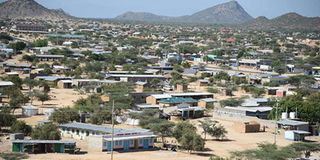Premium
Chasing a mirage? Lokichar on its knees as dream of oil riches wanes

Lokichar town in Turkana County on February 17, 2020. PHOTO | JARED NYATAYA | NATION MEDIA GROUP
What you need to know:
- Tullow Oil scaled down its operations and businesses shut down as money became scarce.
Scale-down of oil operations hits town hard as businesses close down, relocate.
Shops were vacated as hotels registered zero bookings week in and week out.
It’s not clear when Tullow Oil will be back to full operations, if at all
The discovery of crude oil in Turkana County in 2012 was the harbinger of good fortune for residents, who received the news with much hope.
Lokichar, the county headquarters and epicentre of the new and lucrative trade, roared to life, transforming overnight from a sleepy backwater to a thriving urban centre.
British oil explorer Tullow Oil, and its subcontracted companies, came to town bearing bags of money, the promise of jobs, and with them, a sudden population influx. There was more money in circulation than the town had seen in its entire existence.
For a town whose name was synonymous with banditry and cattle-rustling, the future looked bright. To take advantage of the good fortune, entrepreneurs from far and wide scrambled for the once-idle land on the A1 Kitale-Juba highway and put up shopping malls, hotels and entertainment joints.
The price of a 50-by-100 plot rose almost fourfold from Sh90,000 to Sh350,000 by 2015.
But somewhere along the way, the promise of a flood of money that would transform Turkana into a county of plenty never materialised. Instead, the oil haul reduced to a mere trickle as the black gold dream evaporated in the oppressive heat of its arid plains.
Tullow Oil scaled down its operations and businesses shut down as money became scarce. Shops were vacated as hotels registered zero bookings week in and week out.
Black Gold Kileja Hotel owner Eliud Ekeru is a dejected man. His main customers used to be security guards, drivers and suppliers working for Tullow and its subcontracted companies.
“My life had changed. I bought another piece of land hoping to expand my business. At the moment, despite selling rooms at Sh500, I barely get two customers in a week,” he says, adding that he depends on a handful of loyal customers, civil servants and employees of non-governmental organisations for survival.
The slump in business is already being felt by the county’s revenue department that has resorted to negotiating with traders, if only to ensure that they are kept in business.
Lokichar Ward Revenue Officer Francis Samal says taxes collected from businesses are the town’s lifeline. With the slow-down in oil prospecting and partial withdrawal of Tullow Oil, things are looking bleak.
“Many traders are yet to renew their business licences. At least 10 retail and wholesale businesses have either closed down or relocating to other towns," he says.
He observes that when oil operations were at the peak, the monthly revenue collection was always above Sh400,000. The current collection is never a shilling beyond Sh250,000. It will likely continue declining.
Lay-off looming
Black Gold Hotel Lokichar proprietor John Korikel sees retrenchment looming for some of his 35 employees, including 10 security guards unless the situation improves. He may also be forced to reduce the prices of the rooms by half.
His hotel offers outside catering, accommodation and conference facilities and has 40 en suite and air-conditioned rooms that go for Sh4,000 a night.
He is currently building 12 additional rooms.
“I was in talks with Tullow Oil for a one-year contract for 20 rooms and another company for 18 rooms. I had hopes that the hotel would always be full and had started constructing 12 more rooms after taking a loan to have space for my regular customers.
“I have been forced to shelve this plan after Tullow Oil scaled down operations and with no reliable information on when operations will resume,” Mr Korikel laments.
The price of land has reduced from a peak of Sh500,000 to Sh200,000. Residents blame the county leadership for failing to put in place measures to diversify the town’s economy and wean it off over-reliance on oil.
They point out that the county government has been unable to provide reliable water services and the entire town has to rely on water trucked in by the oil company through subcontractors.
This, they say, is a very expensive option, which only enriches a few well-heeled and politically-connected businessmen.
Lack of sufficient and affordable water has also pushed up costs in building and construction as well as in running catering and accommodation facilities.


